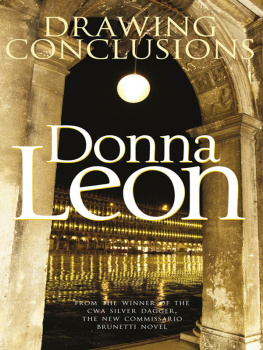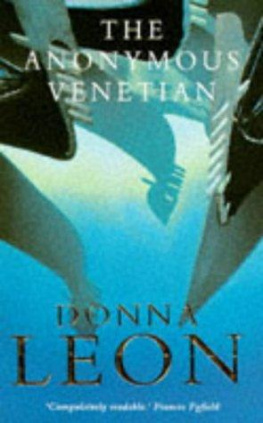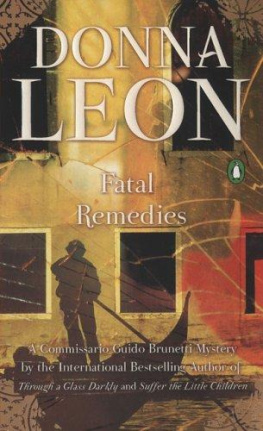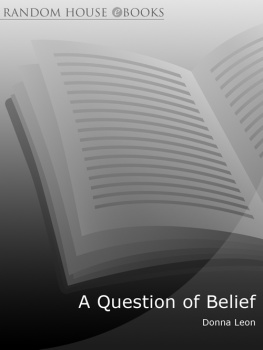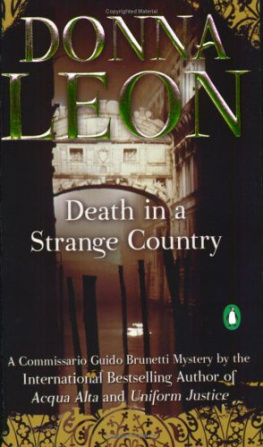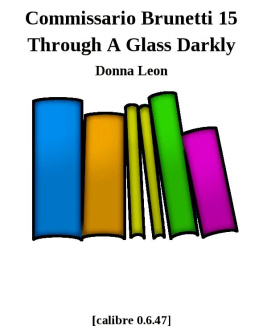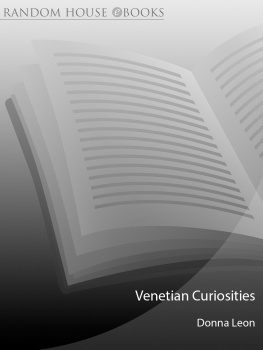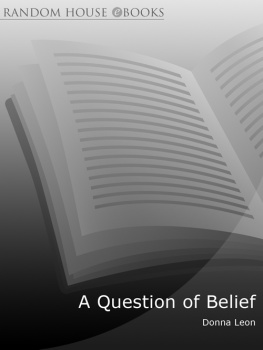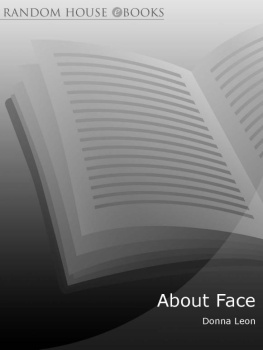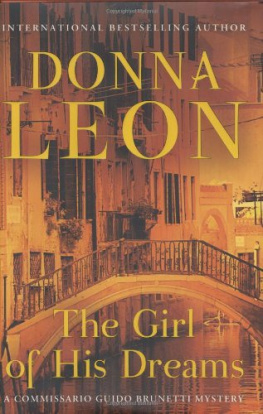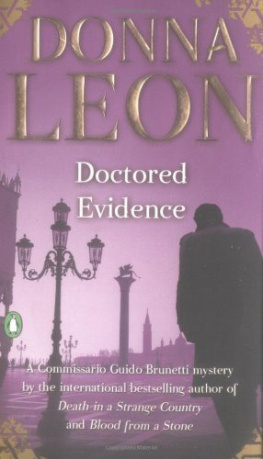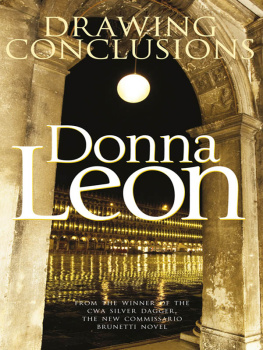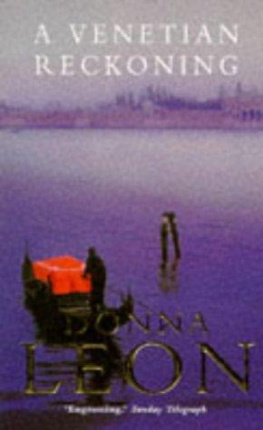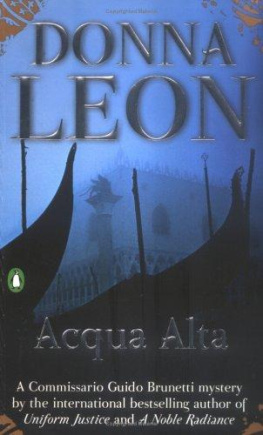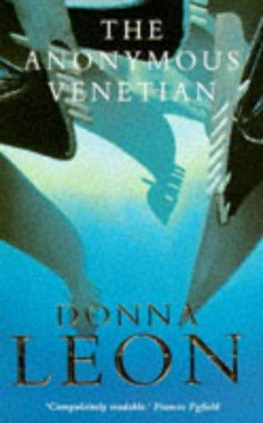Donna Leon - Drawing Conclusions
Here you can read online Donna Leon - Drawing Conclusions full text of the book (entire story) in english for free. Download pdf and epub, get meaning, cover and reviews about this ebook. year: 2011, publisher: Random House, genre: Detective and thriller. Description of the work, (preface) as well as reviews are available. Best literature library LitArk.com created for fans of good reading and offers a wide selection of genres:
Romance novel
Science fiction
Adventure
Detective
Science
History
Home and family
Prose
Art
Politics
Computer
Non-fiction
Religion
Business
Children
Humor
Choose a favorite category and find really read worthwhile books. Enjoy immersion in the world of imagination, feel the emotions of the characters or learn something new for yourself, make an fascinating discovery.
- Book:Drawing Conclusions
- Author:
- Publisher:Random House
- Genre:
- Year:2011
- Rating:3 / 5
- Favourites:Add to favourites
- Your mark:
- 60
- 1
- 2
- 3
- 4
- 5
Drawing Conclusions: summary, description and annotation
We offer to read an annotation, description, summary or preface (depends on what the author of the book "Drawing Conclusions" wrote himself). If you haven't found the necessary information about the book — write in the comments, we will try to find it.
Drawing Conclusions — read online for free the complete book (whole text) full work
Below is the text of the book, divided by pages. System saving the place of the last page read, allows you to conveniently read the book "Drawing Conclusions" online for free, without having to search again every time where you left off. Put a bookmark, and you can go to the page where you finished reading at any time.
Font size:
Interval:
Bookmark:

When a young woman returns from holiday to find her elderly neighbour dead, she immediately alerts the police. Commissario Brunetti is called to the scene but, though there are signs of a struggle, it seems the woman has simply suffered a fatal heart attack. Vice-Questore Patta is eager to dismiss the case as a death from natural causes, but Brunetti believes there is more to it than that. His suspicions are further aroused when the medical examiner finds faint bruising around the victims neck and shoulders, indicating that someone might have grabbed and shaken her. Could this have caused her heart attack? Was someone threatening her?
Conversations with the womans son, her upstairs neighbour, and the nun in charge of the old-age home where she volunteered, do little to satisfy Brunettis nagging curiosity. With the help of Inspector Vianello and the ever-resourceful Signorina Elettra, Brunetti is determined to get to the truth and find some measure of justice.
Insightful and emotionally powerful, Drawing Conclusions reaffirms Donna Leons status as one of the masters of literary crime fiction.
Donna Leon has lived in Venice for thirty years and previously lived in Switzerland, Saudi Arabia, Iran and China, where she worked as a teacher. Her previous novels featuring Commissario Brunetti have all been highly acclaimed, including Friends in High Places, which won the CWA Macallan Silver Dagger for Fiction, Through a Glass, Darkly, Suffer the Little Children, The Girl of His Dreams and, most recently, A Question of Belief.
Also by Donna Leon
Death at La Fenice
Death in a Strange Country
The Anonymous Venetian
A Venetian Reckoning
Acqua Alta
The Death of Faith
A Noble Radiance
Fatal Remedies
Friends in High Places
A Sea of Troubles
Wilful Behaviour
Uniform Justice
Doctored Evidence
Blood from a Stone
Through a Glass, Darkly
Suffer the Little Children
The Girl of His Dreams
About Face
A Question of Belief
Conclusions

This eBook is copyright material and must not be copied, reproduced, transferred, distributed, leased, licensed or publicly performed or used in any way except as specifically permitted in writing by the publishers, as allowed under the terms and conditions under which it was purchased or as strictly permitted by applicable copyright law. Any unauthorised distribution or use of this text may be a direct infringement of the authors and publishers rights and those responsible may be liable in law accordingly.
William Heinemann
Random House, 20 Vauxhall Bridge Road,
London SW1V 2SA
ISBN: 9780434021444 (Trade paperback)
In the name of God Amen. I George Frederick Handel considering the uncertainties of human life doe make this my will in manner following
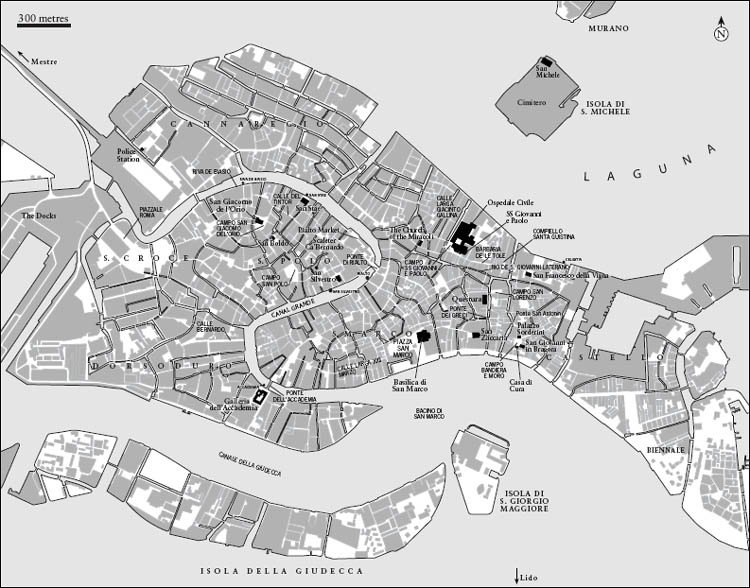
Because she had worked for decades as a translator of fiction and non-fiction from English and German to Italian, Anna Maria Giusti was familiar with a wide range of subjects. Her most recent translation had been an American self-help book about how to deal with conflicting emotions. Though the superficial idiocies she had encountered which had always sounded sillier when she put them into Italian had occasionally reduced her to giggles, some of the text returned to her now, as she climbed the stairs to her apartment.
It is possible to feel two conflicting emotions about the same person at the same time. So it had proven with her feelings towards her lover, whose family she had just returned from visiting in Palermo. Even people we know well can surprise us when they are placed in different surroundings. Different seemed an inadequate word to describe Palermo and what she had found there. Alien, exotic, foreign: not even these words did justice to what she had experienced, yet how to explain it? Did they not all carry telefonini? Was not everyone she met exquisitely well dressed and equally well mannered? Nor was it a question of language, for they all spoke an Italian more elegant than anything she heard from her Veneto-cadenced family and friends. Nor financial, for the wealth of Nicos family was on view at every turn.
She had gone to Palermo in order to meet his family, believing he would take her to stay with them, yet she had spent her five nights in a hotel, one with more stars awarded it than her own translators earnings would have permitted her, had the hotel accepted her insistence that she be allowed to pay the bill.
No, Dottoressa, the smiling hotel director had told her, LAvvocato has seen to it. Nicos father. LAvvocato. She had started by calling him Dottore, which honorific he had dismissed with a wave of his hand, as though her attempt at deference had been a fly. Avvocato had refused to fall from her lips, and so she had settled on Lei and had used the formal pronoun, after that, for everyone in his family.
Nico had warned her that it would not be easy, but he had not prepared her for what she was to experience during the week. He was deferential to his parents: had she seen this behaviour in anyone other than the man she thought she loved, she would have described it as fawning. He kissed his mothers hand when she came into the room and got to his feet when his father entered.
One night, she had refused to attend the family dinner; he had taken her back to the hotel after their own nervous meal together, kissed her in the lobby, and waited while she got into the elevator before going meekly back to sleep in his parents palazzo. When she demanded the next day to know what was going on, he had replied that he was the product of where he lived, and this was the way people behaved. That afternoon, when he drove her back to the hotel and said hed pick her up at eight for dinner, she had smiled and said goodbye to him at the hotel entrance, gone inside and told the young man at the desk that she was checking out. She went to her room, packed, called for a taxi, and left a note for Nico with the concierge. The only seat on the evening plane to Venice was in business class, but she was happy to pay it, thinking it took the place of at least part of the hotel bill she had not been allowed to pay.
Next pageFont size:
Interval:
Bookmark:
Similar books «Drawing Conclusions»
Look at similar books to Drawing Conclusions. We have selected literature similar in name and meaning in the hope of providing readers with more options to find new, interesting, not yet read works.
Discussion, reviews of the book Drawing Conclusions and just readers' own opinions. Leave your comments, write what you think about the work, its meaning or the main characters. Specify what exactly you liked and what you didn't like, and why you think so.

